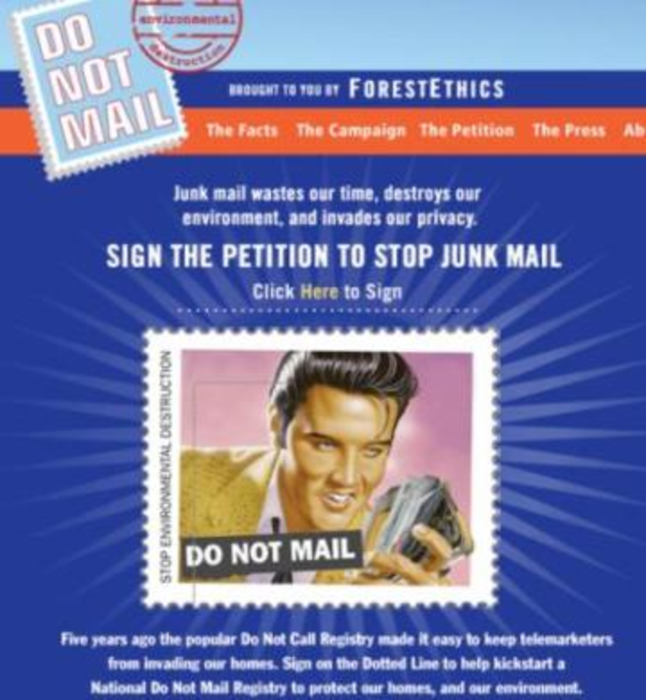The rallying cry for do-not-mail bills in several states grew stronger last week. A do-not-mail campaign to “stop junk mail” launched on March 11 with the support of celebrities including actor Adrian Grenier from HBO’s Entourage and Daryl Hannah, known for her roles in Splash and the Kill Bill series. The campaign is the product of a nonprofit organization called ForestEthics.
The mailing community has countered many of the campaign’s arguments, highlighting the fact that direct mail supports the US Postal Service and its environmental impact is not as great as many other industries.
Jerry Cerasale, SVP of government affairs for the Direct Marketing Association, referred to the ForestEthics campaign at a Direct Marketing Club of New York luncheon on March 13. Cerasale stressed how important it is that the DMA and other direct marketers fight this legislation.
Eighteen do-not-mail bills in 15 states have been introduced, Cerasale said. In addition to its impact on the direct marketing industry, this legislation would dramatically harm the USPS— jobs would be lost and mail costs would become prohibitive, he added.
During a phone briefing on March 11, ForestEthics executive director Todd Paglia said that do-not-mail legislation was “long overdue” in the US. He said junk mail is “invading” people’s homes, and that the 100 billion pieces of mail Americans receive annually require 100 million trees to produce.
Founded in 1994, San Francisco-based ForestEthics has launched donotmailus.org, a Web site on which more than 18,000 people have signed a petition in support of a do-not-mail registry. The organization’s stated mission is to protect endangered forests around the world. Canadian boreal and Indonesian tropical forests are being clear cut to “feed this industry,” Paglia said. He added that ForestEthics would focus its support on legislation at the state level, rather than federal.
He also said that nonprofits and political campaigns should be exempt from such legislation, which would “provide a fast, free and enforceable way to end the annoyance of junk mail.” He added that the do-not-mail registry could be similar to the popular Do Not Call registry, which was passed five years ago.
Vermont State Representative Christopher Pearson, who is sponsoring a do-not-mail bill in his home state, also participated in the phone briefing. He said that junk mail adds to disposal costs as well as recycling fees, which taxpayers have to pay for.
“At a time when our landfills are maxed out, [these bills] seem like a logical step,” Pearson concluded.
Patricia Kachura, SVP of corporate responsibility for the DMA, acknowledged that the industry needs to better communicate with customers about their environmental concerns. Kachura said that according to the US Environmental Protection Agency, direct mail only accounts for 2.4% in weight of the total municipal solid waste generated in the US annually. In 2006, 53.4% of the paper consumed in the US was recovered for recycling, she said.
Direct marketers can also take steps toward reducing their carbon footprint through various efforts including list hygiene, recycling and packaging, Kachura said.
“Their facts are wrong. A lot of what they argue is based on myth,” said Gene Del Polito, president of the Association for Postal Commerce. “When you take away all of those arguments because you have been able to disprove them, the only thing you’re left with is their complaint that advertising in the mail is annoying.”
Del Polito said that people have to pay for the Internet and their phone lines; however, with mail, the sender pays.
“When the day comes [where] you will start paying to receive mail, then I will be willing to concede to you that you have some ability or authority to control what mail you receive,” he said.
He also added that a good way for consumers to stop receiving direct mail is to stop doing business with companies that send it to them. In addition to the DMA’s DMA Choice service, there are a growing number of organizations that offer direct mail opt out services, including catalogchoice.org, ProQuo.com, greendimes.com, 41pounds.org, Catalogend.com, andDirectMail.com.
Cerasale said that these third party list suppression service sites have grown since public consciousness has gotten “more green” and anticipates that more will appear over time. Rather than allowing a third party to control a marketer’s relationship with its customer, marketers need to maintain an open dialogue with its customers, he stressed.
When asked if the USPS would consider creating a centralized direct mail opt out service, USPS spokeswoman Joanne Veto said, “The Postal Service opposes any action that would interfere with our mission of providing universal service at affordable prices. We believe that mail has value.”
In 2006, mailers spent $6 billion on direct mail advertising, which is about 21% of all ad expenditures, Veto said. “They made that investment because mail works. It’s an effective way to reach consumers.”
In response to questions about the ForestEthics campaign, Veto provided a copy of a report entitled The State of America’s Forests by the Society of American Foresters. According to the report, the amount of forestland in the US has remained relatively stable — at around 755 million acres — for the past 100 years as a result of improvements in markets for forest products and reforestation efforts.







